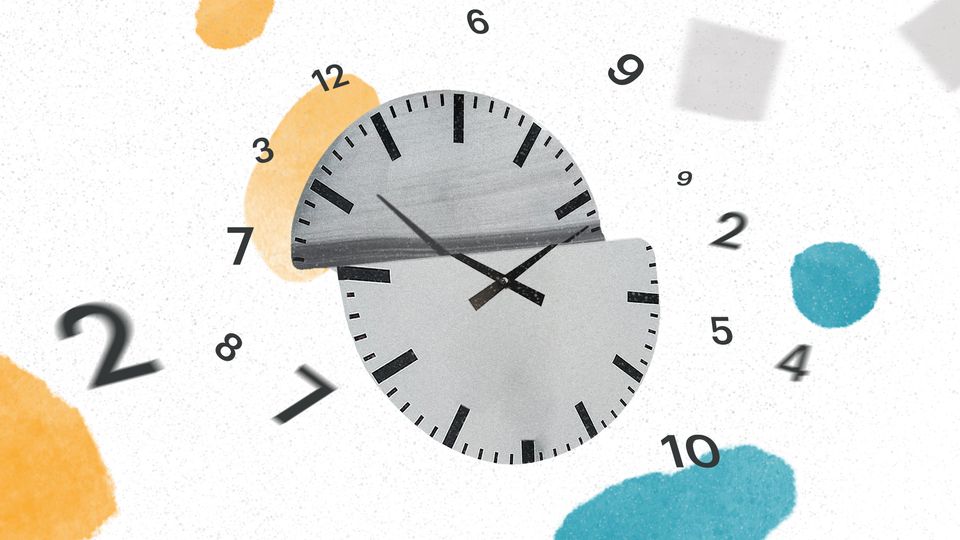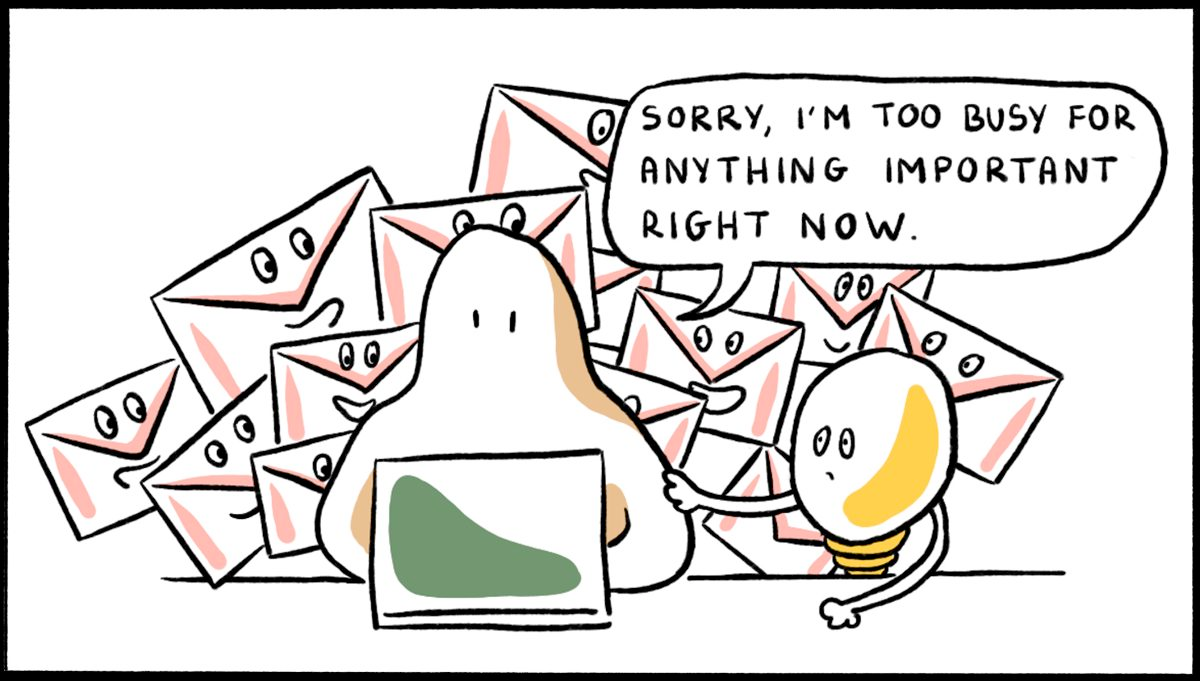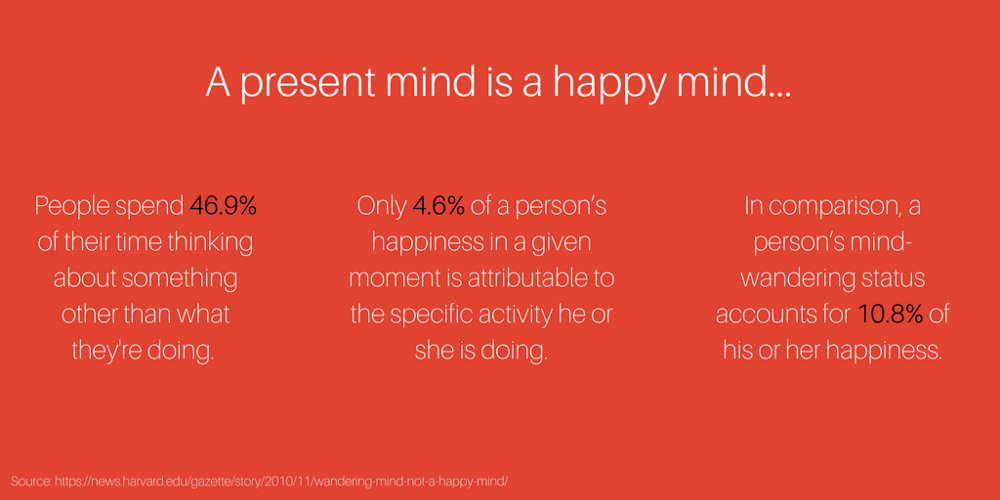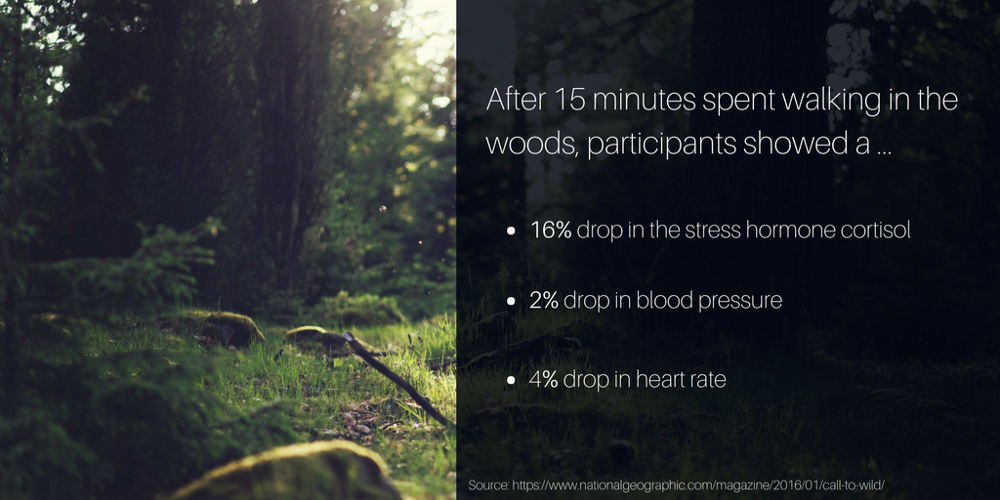Why time management won't solve your time problems
 Artwork by Yin Weihung
Artwork by Yin Weihung
“I’m just so busy.”
How many times have you heard a friend or coworker say this? Perhaps in a tone of exhaustion, but with a detectable hint of proud self-martyrdom? How many times have you said it yourself?
In today’s fast-paced world, we measure our own importance — and the importance of those around us — by how much we can pack into our days. We attempt to outdo, out-hustle, and outperform one another. Or appear to anyways.
It feels like we’re in the midst of a busyness epidemic. The stress and overwhelm of all this busyness is literally contagious.
So what’s the antidote? How can we create more time in our lives? At this point, most of us turn to time management as a silver bullet for our stressors. If we could only use our time more efficiently, we’d have more of it. We could get everything done and feel less stressed.
There’s just one problem with that theory: we already do have more time than ever before. A lot more. On the whole, people in developed countries are actually working far fewer hours than in past decades. This even holds true in the famously work-inclined US; in 1940 the average American work week clocked in at 43.3 hours. In 2016 it was just 34.4 hours. Yet we feel busier than ever. What gives?
One counterintuitive explanation: too much leisure time. The Atlantic calls this the “irony of abundance”:
“…knowing that there are 10 great TV shows you should watch, nine important books to read, eight bourgeois skills your child hasn’t mastered, seven ways you’re exercising wrong, six ways you haven’t sufficiently taken advantage of the city, etc., fosters a kind of metastasized paradox of choice, a perma-FOMO. Knowing exactly what we’re missing out makes us feel guilty or anxious about the limits of our time and our capacity to use it effectively.”
In this way, creating more time is like earning more money — the more you have, the more you want to spend.
At Doist, we’re strong proponents of systems that help you spend your time more intentionally. But when it comes to feeling less busy, time management clearly has its limitations. Here are a few good places for recovering busy-holics to start instead:
You're reading The Async Newsletter – a publication and community dedicated to making sure the "future of work" doesn't repeat the mistakes of the past. Join 7,136 members who are re-imagining what work could be.
1. Identify the values you’re sacrificing to busyness
What, I wonder, do these busy folks get done?”
— Søren Kierkegaard
While today’s society sees busyness as a virtue, the 19th century Danish philosopher Søren Kierkegaard would likely describe it as an affliction:
“Of all ridiculous things the most ridiculous seems to me, to be busy — to be a man who is brisk about his food and his work… What, I wonder, do these busy folks get done?”
As Stephen Evans, a philosophy professor at Baylor University, told Quartz magazine: “Kierkegaard saw busyness as a means of distracting oneself from truly important questions, such as who you are and what life is for. Busy people fill up their time, always find things to do, but they have no principle guiding their life. Everything is important, but nothing is important.”

That’s not to say everything you currently spend time on is meaningless. But if we’re too busy to ask if our values drive our actions, the inertia of busyness can lead us down a very different path than we intended.
Do you value spending time outdoors, but haven’t actually gone for a walk outside in months? Do you value learning, but haven’t taken the time to practice a new skill? Do you value relationships with friends, family, and coworkers, but are too rushed to be fully present when you spend time with them?
It may be worth sacrificing some efficiency to make space for those things that you’ve decided are important.
2. Accept that you can’t do everything
Instead of letting dozens of anxiety-inducing, unfinished tasks snowball on your to-do list day after day, just take them off. Guardian columnist Oliver Burkeman describes the freedom of accepting that you won’t get everything done:
“You can turn, instead, on the far more manageable question of which things to deliberately neglect. The vacuuming? The weekly meeting that nobody cares about anyway? Start from the assumption that something’s got to give, and focus on figuring out what.”
If you use a task manager like Todoist, get comfortable with the postpone and delete functions. If you can’t quite bring yourself to delete a task, give yourself permission to stop actively worrying about it by moving it to a dedicated “Someday/Maybe” project instead. You’ll get the same amount done — you’ll just feel a whole lot better about it.
3. Do one thing at a time (even the unpleasant stuff)
With our already overbrimming schedules, it’s tempting to cram more and more into smaller amounts of time. We answer emails while trying to get work done. We browse the Internet while we eat. We talk on the phone while we drive. We switch from task to task in a near constant state of partial attention. One Harvard study of 2,250 adults found that we spend just over half of our time focusing on one thing.
Yet the same study also revealed that we’re most happy when we’re focusing on what we’re doing in the moment.
“Mind-wandering is an excellent predictor of people’s happiness,” says Matthew Killingsworth, the study’s lead researcher. “In fact, how often our minds leave the present and where they tend to go is a better predictor of our happiness than the activities in which we are engaged.”

Stop and wrap your head around that for a second. What we’re doing is less important to our happiness than how present our minds are while we’re doing it. We’re happier when we focus on just washing the dishes than when we wash dishes while also planning what we’ll make for dinner, contemplating tomorrow’s to-do list, or wondering whether that comment your coworker made in the meeting today was sincere or a back-handed insult.
You don’t need to meditate to be more present in life (although it can’t hurt) — turn everyday activities like cleaning, eating, and cooking into mindful activities. When you find your thoughts wandering to the presentation you’re sure you messed up yesterday or the piles of work you have waiting for you tomorrow, take a breath and bring your attention back to whatever you’re doing in the moment. Above all, be patient with yourself. Like any skill, the more you practice mindfulness, the easier it becomes.
4. Invest in aimless acts of creativity
When time feels scarce, it’s tempting to fill our days with tasks that feel urgent and immediately useful. But acts of aimless creativity may not be useless after all.
One 13-day study of 658 young adults found that people who engaged in a creative activity on one day were more likely to experience positive emotions and greater “flourishing” — a term researchers use to refer to an overall sense of purpose and engagement in life — the following day.
Take the time to do something creative just for its own sake. Cook something new. Write a letter or journal. Do a puzzle or brain teaser. Anything that gets you out of the serious bustle of the day and into a more creative, curious mindset.
5. Read a real, honest-to-goodness book
Even book lovers fall prey to the harried distractions of the Internet. Writer, entrepreneur, and “literary technologist” Hugh McGuire writes about his experience “drowning in a flood of easy [digital] information”:
“I was distracted when at work, distracted when with family and friends, constantly tired, irritable, and always swimming against a wash of ambient stress induced by my constant itch for digital information.”
Though he had built a career around books, McGuire realized that he had read just 12 in the past year. That’s when he decided he needed a change. Now when he gets home at night, he puts away his phone and laptop. (“There’s rarely an email sent at 7:30pm that can’t wait until tomorrow morning.”) Instead of turning on the TV or opening Netflix or browsing the Internet, he reads a book.
“Reading books again has given me more time to reflect, to think, and has increased both my focus and the creative mental space to solve work problems. My stress levels are much lower, and energy levels up.”
Instead of making a futile attempt to keep up with all the content on the Internet, make time for slower forms of consuming information.
6. Spend time with friends in real life
If you’d like to be reminded of how little you’re doing with your time, check Facebook. Social media feeds are filled with peers who are happier, more successful, more fulfilled, and more worldly. Research backs up what many of us already feel to be true — being on social media is stressful. By Facebook’s own admission, passively scrolling through posts makes us feel worse.
On the other hand, numerous studies show that true friendships offer a mental and emotional buffer against the daily pressures in our lives. Feeling supported through our relationships lowers both our cortisol levels and blood pressure — two key physiological indicators of stress. So the next time you get an invitation from a friend and feel too busy to accept, maybe you’re too busy not to accept.
7. Give your time away
Stress and busyness have a way of turning our thoughts and concerns inward — it’s hard to care for others when you feel like you’re barely keeping your own head above water. Yet at least one study shows that people who give time away actually end up feeling like they have more of it, not less. Wharton business professor Cassie Mogilner explains this counterintuitive effect:
“The explanation that emerged in our results is that people who give time feel more capable, confident, and useful. They feel they’ve accomplished something and, therefore, that they can accomplish more in the future. And this self-efficacy makes them feel that time is more expansive.”
Instead of hoarding your scarce time, try giving it to someone else — volunteer, help a coworker, do a friend a favor.
8. Spend 15 minutes outdoors
Is it any surprise that our increasing stress is closely correlated with a rise in sedentary, indoor lifestyles? According to an Environmental Protection Agency survey, the average American spends 93% of their time indoors — 87% in enclosed buildings and 6% in enclosed vehicles. Yet being outdoors has been shown time and time again to have a uniquely relaxing effect on our nervous systems.
One study conducted at Chiba University in Japan found that subjects who spent 15 minutes walking in the woods showed significant decreases in the major physiological signs of stress — a 16% decrease in the stress hormone cortisol, a 2% drop in blood pressure, and a 4% drop in heart rate.

How much time do you spend outside? Are there ways you can incorporate small amounts of nature into your daily routine? Wake up with a 15-minute walk in the morning. Park farther away from your office. Get outside during your lunch break. And maybe, just maybe, leave your phone behind.
9. Make space for stillness and solitude
In an age of acceleration, nothing can be more exhilerating than going slow.
In an age of distraction, nothing is so luxurious as paying attention.
In an age of constant movement, nothing is so urgent as sitting still.
– Pico Iyer
In today’s constantly connected world, we never have to spend time with our own thoughts. We walk around with a 24/7, all-you-can-eat buffet of distractions in our pockets. Travel writer Pico Iyer suggests an antidote to busyness that few of us consider: Go nowhere. Do nothing.
In his TED Talk entitled The Art of Stillness, Iyer describes “sitting still as a way of falling in love with the world and everything in it”:
“I think many of us have the sensation – I certainly do — that we’re standing about two inches away from a huge screen, and it’s noisy and it’s crowded and it’s changing with every second, and that screen is our lives. And it’s only by stepping back and then further back and holding still that we can begin to see what the canvas means and to catch the larger picture…”
I really can’t top Mr. Iyer’s eloquence so I’m just going to leave it at that.
I recognize the irony in writing a list of things to do to feel less busy — they’ll likely just end up as more items on our lists that we’ll feel guilty about not getting done. But I’ve already written this article and you’ve already read it, so I’ll just leave you with a few simple rules for treating life less like a Sisyphean to-do list and more like the inexhaustible source of awe, joy, and meaning it can be:
What fills you up? What leaves you feeling exhausted? Do more of the former and less of the latter.
Try to not take your busy thoughts too seriously. It may be asking too much to get them to shut up entirely, but you can smile at them and then turn back to whatever you were doing before they so rudely interrupted.
Spend some time every day away from screens.
Resist the temptation to constantly distract yourself.
See free time not as a moral failure — or an opportunity to further optimize your life — but as a gift.
Our time is finite. Instead of always managing the shit out of it, let’s give ourselves permission to slow down and savor it.